大一上学期英语期末考试复习
大学英语大一期末复习
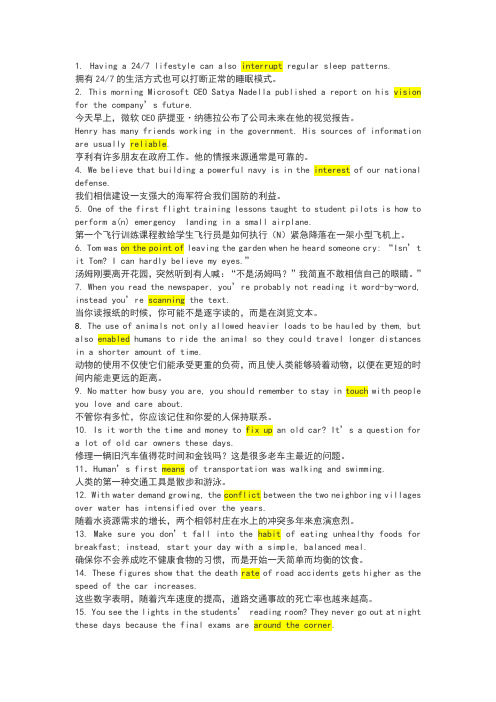
1.Having a 24/7 lifestyle can also interrupt regular sleep patterns.拥有24/7的生活方式也可以打断正常的睡眠模式。
2. This morning Microsoft CEO Satya Nadella published a report on his vision for the company’s future.今天早上,微软CEO萨提亚·纳德拉公布了公司未来在他的视觉报告。
Henry has many friends working in the government. His sources of information are usually reliable.亨利有许多朋友在政府工作。
他的情报来源通常是可靠的。
4. We believe that building a powerful navy is in the interest of our national defense.我们相信建设一支强大的海军符合我们国防的利益。
5. One of the first flight training lessons taught to student pilots is how to perform a(n) emergency landing in a small airplane.第一个飞行训练课程教给学生飞行员是如何执行(N)紧急降落在一架小型飞机上。
6. Tom was on the point of leaving the garden when he heard someone cry: “Isn’t it Tom? I can hardly believe my eyes.”汤姆刚要离开花园,突然听到有人喊:“不是汤姆吗?”我简直不敢相信自己的眼睛。
”7. When you read the newspaper, you’re probably not reading it word-by-word, instead you’re scanning the text.当你读报纸的时候,你可能不是逐字读的,而是在浏览文本。
大一英语期末考试题型
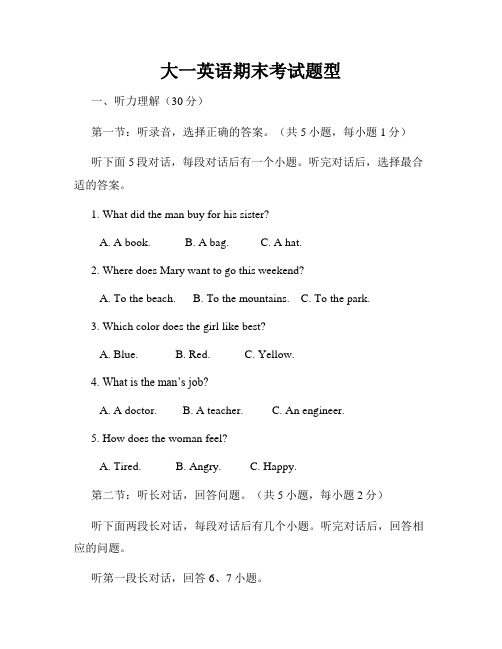
大一英语期末考试题型一、听力理解(30分)第一节:听录音,选择正确的答案。
(共5小题,每小题1分)听下面5段对话,每段对话后有一个小题。
听完对话后,选择最合适的答案。
1. What did the man buy for his sister?A. A book.B. A bag.C. A hat.2. Where does Mary want to go this weekend?A. To the beach.B. To the mountains.C. To the park.3. Which color does the girl like best?A. Blue.B. Red.C. Yellow.4. What is the man’s job?A. A doctor.B. A teacher.C. An engineer.5. How does the woman feel?A. Tired.B. Angry.C. Happy.第二节:听长对话,回答问题。
(共5小题,每小题2分)听下面两段长对话,每段对话后有几个小题。
听完对话后,回答相应的问题。
听第一段长对话,回答6、7小题。
6. What does the man’s father do?A. A doctor.B. A teacher.C. An engineer.7. How often does the man visit his family?A. Every week.B. Every month.C. Every year.听第二段长对话,回答8、9、10小题。
8. What is the woman’s favorite subject?A. Math.B. English.C. Science.9. Why does the woman have to leave early?A. She has an appointment.B. She has to catch a train.C. She is not feeling well.10. What will the man do after the class?A. Study at the library.B. Go home.C. Play basketball.第三节:听独白,回答问题。
大学英语期末知识点大一

大学英语期末知识点大一大学英语是大一学生必修的一门课程,它的内容丰富多样,包括英语单词、语法、阅读理解、听力和口语等方面的知识。
下面将针对大学英语期末考试的几个重要知识点进行详细介绍。
一、英语单词掌握一定量的英语词汇是理解和应用英语语言的基础。
在期末考试中,通常会涉及词汇选择、词义辨析以及填空等题型。
为了提高词汇量,我们可以通过背单词卡片、词汇书以及在线词汇学习工具来进行学习。
此外,利用单词在句子中的实际运用场景,可以加深对单词的记忆。
二、语法知识掌握英语语法是理解和构建正确句子的基础。
在期末考试中,语法知识主要体现在填空、改错和翻译等题型中。
常见的语法知识点包括时态、语态、虚拟语气、从句和介词等。
我们可以通过阅读语法书籍、练习语法题以及做语法习题来加强对语法知识的掌握。
三、阅读理解阅读理解是大学英语考试的重要组成部分。
在期末考试中,通常会涉及短文的理解、主旨概括、细节把握以及文章写作意图等方面的题目。
为了提高阅读理解能力,我们可以多读英语文章,培养阅读习惯和速度,并学会使用扫读和略读等阅读技巧。
四、听力听力是大学英语考试的另一个重要部分。
期末考试中,听力部分通常包括听对话、听短文和听长对话等。
要提高听力能力,我们可以多听英语材料,如英语歌曲、电影、英语广播等,锻炼自己的听力理解能力。
同时,可以通过做听力练习题和模拟考试,提高对于听力材料的理解和把握。
五、口语口语是英语学习的重要环节之一。
在期末考试中,通常会有口语考试的部分。
为了提高口语表达能力,我们可以多与他人进行英语对话,加入英语角或者组织口语交流活动。
此外,可以模仿英语原声录音或者参加英语口语培训班,提高自己的发音和口语表达能力。
总结起来,大学英语期末考试的知识点主要包括英语单词、语法、阅读理解、听力和口语。
要想在考试中取得好成绩,我们需要通过积极学习相关知识,掌握相关技巧,并进行充分的练习和训练。
只有融会贯通,才能在大学英语的学习中取得好成绩。
大一上学期英语期末考试复习
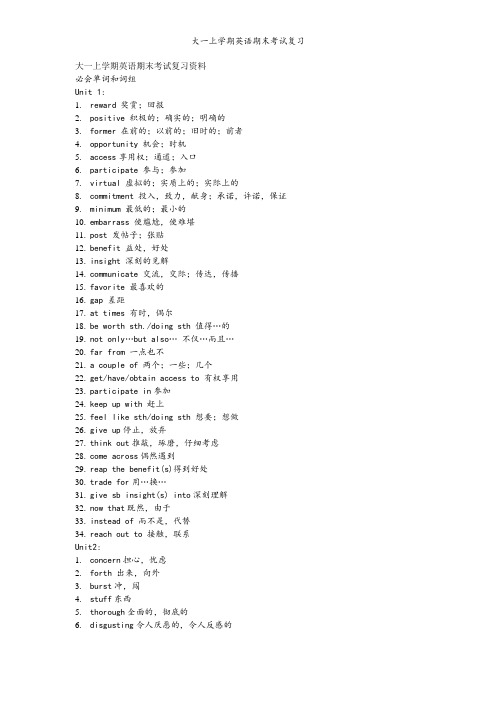
大一上学期英语期末考试复习资料必会单词和词组Unit 1:1.reward 奖赏;回报2.positive 积极的;确实的;明确的3.former 在前的;以前的;旧时的;前者4.opportunity 机会;时机5.access享用权;通道;入口6.participate 参与;参加7.virtual 虚拟的;实质上的;实际上的mitment 投入,致力,献身;承诺,许诺,保证9.minimum 最低的;最小的10.embarrass 使尴尬,使难堪11.post 发帖子;张贴12.benefit 益处,好处13.insight 深刻的见解municate 交流,交际;传达,传播15.favorite 最喜欢的16.gap 差距17.at times 有时,偶尔18.be worth sth./doing sth 值得…的19.not only…but also…不仅…而且…20.far from 一点也不21.a couple of 两个;一些;几个22.get/have/obtain access to 有权享用23.participate in参加24.keep up with 赶上25.feel like sth/doing sth 想要;想做26.give up停止,放弃27.think out推敲,琢磨,仔细考虑e across偶然遇到29.reap the benefit(s)得到好处30.trade for用…换…31.give sb insight(s) into深刻理解32.now that既然,由于33.instead of 而不是,代替34.reach out to 接触,联系Unit2:1.concern担心,忧虑2.forth 出来,向外3.burst冲,闯4.stuff东西5.thorough全面的,彻底的6.disgusting令人厌恶的,令人反感的7.upset不适的8.tune 曲调9.offensive 讨厌的;令人不快的10.appeal 吸引11.rid 摆脱…的12.negative负面的13.influence影响14.patience耐心15.along with一起,一道16.turn off关闭17.burst into闯入;突然开始18.over and over一再,反复19.reach for伸手去摸;20.turn up调大,开大21.turn down调小,开小22.as well as除…以外;和23.turn on打开开关24.as usual像往常一样25.in peace and quiet平静地26.wake up(使)醒来27.make one’s blood boil使某人生气28.get rid of摆脱;除去29.knots in one’s stomach紧张,不安30.in any case无论如何;不管怎样31.talk sth over商议,讨论Unit4:1.impression印象2.conscious意识到的,有意识的3.range变动;范围4.introduction介绍,引见;引进5.encounter意外相遇6.focus使集中7.physical身体的;物质的8.rate速度;率9.impress给…留下深刻的印象10.shake摇动11.match和…相一致12.depress使抑郁13.contact接触;联系14.relax放松15.powerful有影响力的;强壮的16.entertainment娱乐17.roar咆哮18.make up one’s mind 下定决心19.range from…to…从…到…变化20.be committed to献身于21.be absorbed in全神贯注于22.fix one’s eyes on凝视23.drive sb crazy逼得某人发疯24.at one’s best处于最佳状态25.lighten up放轻松26.take sb or sth seriously认为某人或某物重要Unit6:1.continuous连续的2.wicked极坏的3.tremble颤抖4.dump倾倒;垃圾场5.route路线6.outdoor户外的7.outdoors在户外8.register意识到;注意到9.indoors在室内10.peculiar奇怪的,罕见的;独特的11.graduate毕业12.boast夸口,吹嘘13.employment职业,工作14.contrary相反的15.harm伤害16.theory理论17.head to去;去往18.make the rounds逐一巡查、访问19.go with与…相配20.look sb in the eye(s)坦然正视某人21.at the sound of一听到22.nothing but只是23.be/feel ashamed of为…感到羞耻24.boast about/of吹嘘25.stay away from避开26.stay at停留在27.contrary to与…相反28.look down on/upon看不起29.be in for将遭遇30.hold water经得起考验31.leave behind忘记带;留下Unit7:1.unusual不寻常的,不一般的2.shave剃(胡须),刮(毛发)3.instinct本能4.sideways向一边,从侧面5.slight瘦小的6.polish擦光,擦亮7.attach系,贴8.identify识别9.offend违法;冒犯10.detail细节11.mercy慈悲,怜悯,仁慈12.fade逐渐消失13.fry油煎,油炒14.rob抢劫15.stiff(酒)浓的,烈性的;僵硬的16.current流,潮流;现时的,当前的17.foundation基础18.stick插入;粘贴19.face to face (with)面对面的;面临着20.pull into(车)停靠,驶向(一旁)21.as if好像22.attach…to…系在…上23.have mercy on sb对某人仁慈24.get to one’s feet站起来25.look through浏览;查找26.out of control失去控制27.eat (away) at 侵蚀;消耗Unit9:1.arouse引起,激起2.remarkable 显著的3.ease容易;减轻4.outstanding杰出的5.accomplish完成6.investigate调查7.mysterious神秘的8.analysis分析9.credit学分;信任10.responsibility责任11.amount数量12.entertain考虑13.alternative供选择的14.grant给予;资助15.cease停止16.adapt适应17.profit有益于;利润18.alter改变19.performance成绩;表现;表演20.stand out突出,出色21.no matter how/where/what不管怎样(哪里,什么等)22.turn in上交23.with ease容易地24.sit back闲坐着25.get behind拖延26.get sth out of the way完成或处理某事27.strike sb as sth给某人某种感觉或印象28.have to do with与…有关29.plow through艰难地完成30.adapt to(使)适应编:王。
大一大学英语期末考试重点单词
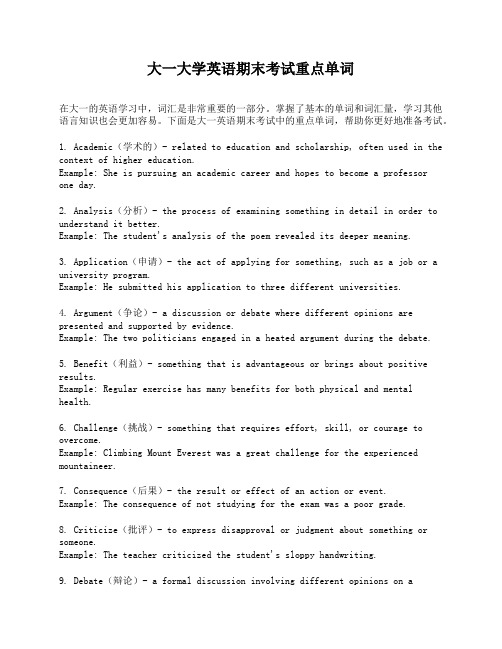
大一大学英语期末考试重点单词在大一的英语学习中,词汇是非常重要的一部分。
掌握了基本的单词和词汇量,学习其他语言知识也会更加容易。
下面是大一英语期末考试中的重点单词,帮助你更好地准备考试。
1. Academic(学术的)- related to education and scholarship, often used in the context of higher education.Example: She is pursuing an academic career and hopes to become a professorone day.2. Analysis(分析)- the process of examining something in detail in order to understand it better.Example: The student's analysis of the poem revealed its deeper meaning.3. Application(申请)- the act of applying for something, such as a job or a university program.Example: He submitted his application to three different universities.4. Argument(争论)- a discussion or debate where different opinions are presented and supported by evidence.Example: The two politicians engaged in a heated argument during the debate.5. Benefit(利益)- something that is advantageous or brings about positive results.Example: Regular exercise has many benefits for both physical and mental health.6. Challenge(挑战)- something that requires effort, skill, or courage to overcome.Example: Climbing Mount Everest was a great challenge for the experienced mountaineer.7. Consequence(后果)- the result or effect of an action or event.Example: The consequence of not studying for the exam was a poor grade.8. Criticize(批评)- to express disapproval or judgment about something or someone.Example: The teacher criticized the student's sloppy handwriting.9. Debate(辩论)- a formal discussion involving different opinions on aparticular topic.Example: The debate on climate change was lively and informative.10. Evaluate(评估)- to assess or judge the value, importance, or quality of something.Example: The professor asked the students to evaluate each other's presentations.11. Evidence(证据)- facts, information, or data used to support a claim or argument.Example: The detective collected evidence at the crime scene to solve the case.12. Global(全球的)- relating to the whole world, encompassing or affecting everyone.Example: Climate change is a global issue that requires international cooperation.13. Innovate(创新)- to introduce new ideas, methods, products, etc. to improve or make changes.Example: The company prided itself on its ability to innovate and stay aheadof the competition.14. Objective(客观的)- not influenced by personal feelings or opinions; based on facts.Example: The reporter tried to present the news in an objective and unbiased manner.15. Perspective(观点)- a particular way of thinking about or viewing something; point of view.Example: The author's novel offers a unique perspective on love and relationships.16. Promote(促进)- to help or encourage the growth or development of something.Example: The company used social media to promote its new product.17. Research(研究)- the systematic investigation into and study of materials and sources to establish facts and reach new conclusions.Example: The scientist spent years conducting research on cancer treatments.18. Source(来源)- a person, place, or thing from which something comes or isobtained.Example: The historian relied on primary sources such as letters and diariesfor her research.19. Theory(理论)- an explanation or idea that is supported by evidence and used to explain a particular set of phenomena.Example: Einstein's theory of relativity revolutionized our understanding of physics.20. Value(价值)- the importance, worth, or usefulness of something. Example: The company prides itself on delivering high-value products to its customers.21. Wisdom(智慧)- the ability to think and act using knowledge, experience, understanding, common sense, and insight.Example: The elderly man shared his wisdom with the young people in the village.22. Xenophobia(仇外)- a deep rooted fear or hatred of foreigners or anything that is strange or foreign.Example: The community worked hard to combat xenophobia and promote tolerance.23. Youth(青春)- the period between childhood and adulthood, also refers to people who are young.Example: The non-profit organization focuses on providing education and opportunities for youth in underprivileged areas.24. Zeal(热情)- great energy, enthusiasm, or eagerness in pursuit of an objective.Example: The volunteer's zeal to help others was an inspiration to everyone around her.25. Ability(能力)- the capacity or skill to do something.Example: The athlete's ability to run fast earned him a spot on the national team.26. Bold(大胆的)- not hesitating or fearful in the face of actual orpossible danger or rebuff; courageous and daring.Example: The entrepreneur's bold decision to invest in a new technology paid off.27. Creative(创造性的)- having the ability to create or invent something new, original, or imaginative.Example: The artist's creative use of colors and textures made her paintings famous.28. Diversity(多样性)- the state of being diverse; variety or multiformity. Example: The university values diversity and encourages students fromdifferent backgrounds to apply.29. Effort(努力)- the exertion of physical or mental power to do something. Example: It takes a lot of effort to learn a new language.30. Freedom(自由)- the state of being free or at liberty to act, speak, or think as one wants without any constraints.Example: The country's constitution guarantees freedom of speech and expression.31. Genius(天才)- an exceptional natural capacity of intellect, especiallyas shown in creative and original work in science, art, music, etc.Example: Mozart was a musical genius who composed his first symphony at theage of eight.32. Happiness(幸福)- the state of being happy and the feeling that comesover you when you know life is good and you can't help but smile.Example: Spending time with friends and family brings me happiness.33. Integrity(正直)- the quality of being honest and having strong moral principles; moral uprightness.Example: The politician's integrity and honesty made her a role model for many.34. Justice(正义)- the quality of being just, fair, and impartial.Example: The judge's role is to ensure that justice is served in the courtroom.35. Knowledge(知识)- facts, information, and skills acquired by a person through experience or education; the theoretical or practical understanding of a subject.Example: The professor's knowledge of ancient history was extensive and impressive.36. Leadership(领导)- the action of leading an organization or group of people.Example: The team's success was due to the coach's strong leadership and guidance.37. Motivation(动机)- the reason or reasons one has for acting or behavingin a particular way.Example: The athlete's motivation to win the gold medal pushed him to train harder than ever before.38. Optimism(乐观)- hopefulness and confidence about the future or the successful outcome of something.Example: The entrepreneur's optimism about the new business venture inspired her team to work harder.39. Patience(耐心)- the capacity to accept or tolerate delay, problems, or suffering without becoming annoyed or anxious.Example: The teacher's patience with her students helped them learn and grow.40. Quality(质量)- the standard of something as measured against otherthings of a similar kind; the degree of excellence of something.Example: The company's commitment to quality ensures that its products are reliable and durable.41. Respect(尊重)- a feeling of deep admiration for someone or something elicited by their abilities, qualities, or achievements.Example: The students showed respect to their teacher by listening attentively in class.42. Success(成功)- the accomplishment of an aim or purpose.Example: The entrepreneur's hard work and determination led to the success of his business.43. Talent(才能)- natural aptitude or skill.Example: The young actress's talent shone on stage, earning her a standing ovation.44. Understanding(理解)- the ability to comprehend something.Example: The therapist's understanding of human behavior helped her patients overcome their challenges.45. Vision(愿景)- the ability to think about or plan the future with imagination or wisdom.Example: The company's vision is to become the world's leading provider ofeco-friendly products.46. Willpower(意志力)- the strength of will to carry out one's decisions, wishes, or plans.Example: The athlete's willpower helped him break the world record in the marathon.47. eXEMPLARY(模范的)- serving as a commendable pattern or example. Example: The teacher's exemplary behavior inspired her students to strive for excellence.48. Yield(产量)- the amount of agricultural produce harvested from a piece of land.Example: The farmer increased the yield of his crops by using advanced farming techniques.49. Zealot(狂热者)- a person who is fanatical and uncompromising in pursuit of their religious, political, or other ideals.Example: The zealot's passionate beliefs led him to join a radical political group.50. Advocate(提倡者)- a person who puts a case on behalf of someone else or the cause of something.Example: The advocate fought for the rights of the marginalized and underrepresented groups in society.51. Benevolence(仁慈)- the quality of being well meaning; kindness. Example: The billionaire's benevolence was evident in his numerous charitable donations.52. Charity(慈善)- the voluntary giving of help, typically in the form of money, to those in need.Example: The charity organization provided food and shelter for the homeless during the winter months.53. Dedication(奉献)- the quality of being dedicated or committed to a task or purpose.Example: The doctor's dedication to her patients was evident in her long hours and compassionate care.54. Enthusiasm(热情)- intense and eager enjoyment, interest, or approval. Example: The coach's enthusiasm for the game inspired his players to givetheir best.55. Forgiveness(宽恕)- the action or process of forgiving or being forgiven. Example: The victim's forgiveness of her attacker led to a remarkable reconciliation.56. Generosity(慷慨)- the quality of being generous; readiness to give more of something, especially money, than is strictly necessary or expected. Example: The philanthropist's generosity provided scholarships for underprivileged students to attend college.57. Hope(希望)- a feeling of expectation and desire for a certain thing to happen.Example: The patient's hope for a cure gave her the strength to fight her illness.58. Idealism(理想主义)- the pursuit of high or noble principles, goals, or standards.Example: The idealism of the young activist pushed her to fight for social justice and equality.59. Justice(正义)- the quality of being just, fair, and impartial.Example: The judge's role is to ensure that justice is served in the courtroom.60. Kindness(善良)- the quality of being gentle, caring, and considerate. Example: The neighbor's kindness was evident in her willingness to help others in need.61. Liberty(自由)- the state of being free or at liberty to act, speak, or think as one wants without any constraints.Example: The country's constitution guarantees freedom of speech and expression.62. Mercy(仁慈)- compassion or forgiveness shown towards someone whom it is within one's power to punish or harm.Example: The ruler's mercy spared the lives of the captured soldiers.63. Nobility(高贵)- the quality of being noble in character; moral excellence.Example: The nobleman's reputation for honesty and integrity was well-known in the community.64. Optimism(乐观)- hopefulness and confidence about the future or the successful outcome of something.Example: The entrepreneur's optimism about the new business venture inspired her team to work harder.65. Patience(耐心)- the capacity to accept or tolerate delay, problems, or suffering without becoming annoyed or anxious.Example: The teacher's patience with her students helped them learn and grow.66. Quality(质量)- the standard of something as measured against other things of a similar kind; the degree of excellence of something.Example: The company's commitment to quality ensures that its products are reliable and durable.这些单词是大一英语期末考试中的重点。
大一英语_精品文档
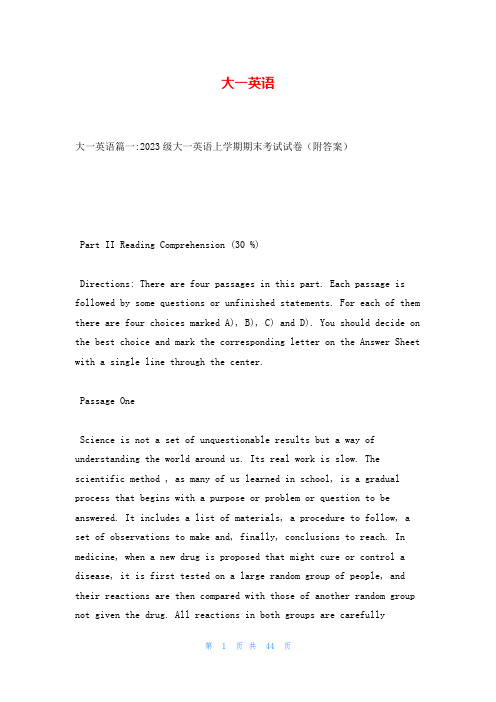
大一英语大一英语篇一:2023级大一英语上学期期末考试试卷(附答案)Part II Reading Comprehension (30 %)Directions: There are four passages in this part. Each passage is followed by some questions or unfinished statements. For each of them there are four choices marked A), B), C) and D). You should decide on the best choice and mark the corresponding letter on the Answer Sheet with a single line through the center.Passage OneScience is not a set of unquestionable results but a way of understanding the world around us. Its real work is slow. The scientific method , as many of us learned in school, is a gradual process that begins with a purpose or problem or question to be answered. It includes a list of materials, a procedure to follow, a set of observations to make and, finally, conclusions to reach. In medicine, when a new drug is proposed that might cure or control a disease, it is first tested on a large random group of people, and their reactions are then compared with those of another random group not given the drug. All reactions in both groups are carefullyrecorded and compared, and the drug is evaluated. All of this takes time and patience.It’s the result of course, that makes the best news—not the years of quiet work that characterize the bulk of scientific inquiry. After an experiment is concluded or an observation is made, the result continues to be examined critically. When it is submitted for publication, it goes to a group of the scientist’s colleagues, who review the work. Einstein was right when he said: “No amount of experimentation can ever prove me right, a single experiment can at any time prove me wrong.”In August 1996, NASA announced the discovery in Antarctica of a meteorite(流星) from Mars that might contain evidence of ancient life on another world. As President Clinton said that day, the possibility that life existed on Mars billions of years ago was potentially one of the great discoveries of our time.After the excitement wore down and initial papers were published, other researchers began looking at samples from the same meteorite. Some concluded that the “evidence of life” was mostly contamination from Antarctic ice or that there was nothing organic at all in the rock.Was this a failure of science, as some news reports trumpetedNo! It was a good example of the scientific method working the way it is supposed to. Scientists spend years on research, announce theirfindings, and these findings are examined by other scientists.That’s how we learn. Like climbing a mountain, we struggle up three feet and fall back two. It’s a process fil led with disappointments and reverses, but somehow we keep moving ahead.21. The author’s main purpose in writing this passage is to state that ____________.A) most scientific discoveries are not reliableB) mass media is misleading because it looks at the research results onlyC) scientific research is a process filled with reverses and requires slow and patientworkD) repeated experiments are necessary before medicine can be used in patients22. Publication of a scientific finding signifies __________.A) a challenge to fellow scientists to prove it wrongB) the end of a processC) the beginning of a new scientific inquiryD) the soundness of the result23. Einstein’s wor ds are used to show that he thought___________.A) experiments have proved him rightB) scientists do not need so many experimentsC) one experiment is not enough to prove him wrong.D) scientific ideas are never free from challenge24. NASA’s announcement of the discovery of evidence of ancientlife on Mars shows _________.A) the way human beings learn about natureB) the failure of the scientific methodC) the fruitlessness of human search for life on another worldD) the excitement brought by scientific findings25. It can be inferred from the passage that the media is interested in __________.A) the process of scientific researchB) the results of scientific researchC) the scientists who do the researchD) the effects of scientific research on human lifePassage TwoNormally a student must attend a certain number of courses in order to graduate, and each course which he attends gives him a credit which he may count towards a degree. In many American universities the total work for a degree consists of thirty-six courses each lasting for one semester. A typical course consists of three classes per week for fifteen weeks; while attending a university a student will probably attend four or five courses during each semester. Normally a student would expect to take four years attending two semesters each year. It is possible to spread the period of work for the degree over a longer period. It is also possible for a student to move between one university and another during his degree course, though this is not in fact done as a regular practice.For every course that he follows a student is given a grade, whichis recorded, and the record is available for the student to show to prospective employers. All this imposes a constant pressure andstrain of work, but in spite of this some students still find timefor great activity in student affairs. Elections to positions in student organizations arouse much enthusiasm. The effective work ofmaintaining discipline is usually performed by students who advise the academic authorities. Any student who is thought to have broken the rules, for example, by cheating has to appear before a student court. With the enormous numbers of students, the operation of the system does involve a certain amount of activity. A student who has held one of these positions of authority is much respected and it will be of benefit to him later in his career.26. Normally a student would at least attend __________classes each week.A) 36B) 12C) 20D) 1527. According to the first paragraph an American student is allowed _______.A) to live in a different universityB) to take a particular course in a different universityC) to live at home and drive to classesD) to get two degrees from two different universities28. American university students are usually under pressure of work because_________.A) their academic performance will affect their future careersB) they are heavily involved in student affairsC) they have to observe university disciplineD) they want to run for positions of authority29.Some students are enthusiastic for positions in student organizations probably because_________.A) they hate the constant pressure and strain of their studyB) they will then be able to stay longer in the universityC) such positions help them get better jobsD) such positions are usually well paid30. The student organizations seem to be effective in _________.A) dealing with the academic affairs of the universityB) ensuring that the students observe university regulationsC) evaluating students’ performance by bringing them before a courtD) keeping up the students’ enthusiasm for social activitiesPassage ThreeDoreen Sykora is now a junior at Mcgill University. She had a difficult time when she first began college. She said, “I was always well prepared for my examinations. But I would go in to class to take the exam, and I would fall apart. I could not answer the questions correctly-----even though I knew the answers! I would just blank out beca use of nervousness and fear.” Hitoshi Sakamoto, an anthropology student at Temple University in Tokyo reports similar experiences.These two young students were experiencing something called test anxiety. Because a student worries and is stressed about a test, his or her mind does not work as well as it usually does. The student cannot write or think clearly because of the severe tension and nervousness.Now there are special university courses to help students. In these courses, advisors and psychologists try to help students by teaching them to manage test anxiety. Such a course helps students learn to live with stress and not fail because of it. First students take a practice test to measure their worry level. If the tests show that their stress level is high, the students can take a short course tomanage the fear. These courses teach students how to relax their bodies. They get training to become calm in very tense situations. By controlling their nervousness, they can let their minds work more easily. Learned information then comes out without difficulty on a test.Doreen Sykora saw immediate results after taking such a course. She now has enthusiasm about the relaxation methods. “Mostly, what I do is imagine myself in a very calm place. Then I imagine myself picking up a pencil. I move slowly and carefully. I breathe easily and letall the tension out. With each breath, more worry leaves me. Itreally works too. My grades have improved greatly! I’m really doing well at McGill now. This relaxation method works not only on examinations, but it has improved the rest of my life as well.”For Hitoshi in Tokyo, the results were much the same. He is enjoying school a lot more and learning more.31. Doreen Sykora and Hitoshi Sakamoto were filled with nervousness and fear during examinations because they were__________.A) not ready and unaware of the answersB) physically so weak that they fell apartC) subject to test anxietyD) unable to write or think clearly32. The higher the students’ worry level is, __________.A) the less calm and relaxing they areB) the more difficult they will be trained to manage fearC) the more stressed and tense they areD) the longer courses they will take to manage fear33. What’s the purpose of some special university student-help coursesA) To help students to reduce test anxiety.B) To show a stress level experienced by students.C) To learn more knowledge about test anxiety.D) To have a better understanding of test anxiety.34. What’s the meaning of “blank out” in paragraph oneA) To be like a blanket.B) To be sure of an answer.C) To be relaxed.D) To be unable to think clearly.35.Which of the following best sums up the organization of the passageA) Examples----theories----ideas.B) Problem----strategy----examples----results.C) General statement----examples----result.D) Strategy----experiment----examples.Part III Vocabulary and Structure (15 %)Directions: There are 30 incomplete sentences in this part. For each sentence there are four choices marked A), B), C) and D). Choose the ONE that best completes the sentence. Then mark the corresponding letter on the Answer Sheet with a single line through the center.36. The president made a _______ speech at the opening ceremony of the sports meeting, which encouraged the sportsmen greatly.A) vigorousB) tediousC) flatD) harsh37. It is not easy to learn English well but if you _______, you will succeed in the end.A) hang upB) hang aboutC) hang onD) hang onto38. Remember that customers don’t _______ about prices in that city.A) debateB) bargainC) disputeD) consult39. The newcomers found it impossible to _______ themselves to theclimate sufficiently to make permanent homes in the new country.A) suitB) adaptC) regulateD) coordinate40. A _______ to this problem is expected to be found before long.A) resultB) functionC) settlementD) solution41. You have nothing to _______ by refusing to listen to our advice.A) gainB) graspC) seize42. One day I _______ a newspaper article about the retirement of an English professor at a nearby state college.A) came acrossB) came aboutC) came afterD) came at43. A peculiarly pointed chin is his memorable facial _______.A) markB) featureC) traceD) appearance44. I hope that you’ll be more careful in typing the letter. Don’t _______ anything.A) omitC) lackD) withdraw45. Our new house is very _______ for me as I can get to the office in five minutes.A) adaptableB) convenientC) availableD) comfortable更多大一英语期末考试卷推荐:1.2023-2023大一上英语期末考试试卷及答案2.2023年大一英语期末考试试题及答案3.大一英语期末考试试题精选4.2023级大一英语上学期期末考试试卷(附答案)5.2023最新大一英语期末考试试题6.2023年大一英语期末考试复习重点内容7.2023年大一英语期末考试试题s("content_bottom"); 共3页:上一页123下一页s("page_bottom");大一英语篇二:2023大一英语期末试题带答案 I. Spelling: (10%)Directions: Listen to the following words and write them down. Each of them will be read twice.II.Dictation: (10%)Directions: You will hear a passage read three times. At the first reading, you should listen carefully for its general idea. At the second reading, you are required to write down the exact words you have just heard (with proper punctuation). At the third reading, you should check carefully what you have written down.III.Word Derivation: (5%)Directions: Fill in the blank in each sentence with an appropriate form of the word given in the bracket.1.Do grades determine __________ (eligible) for graduate school or special programs2.The result of the bilateral talks of the countries is ________ with our expectation. (correspond)3.There does, however, appear to be very little evidence to directly support such theories which thus remain largely __________. (speculate)4.Your misunderstandings derive from a completely ______ idea of the nature of charity. (err)5.The book is essentially a(n) ______ to religious tolerance. (exhort)IV. Phrasal Verbs: (5%)Directions: Fill in the blank in each sentence with a phrasal verbin its proper form. The base verb is given in the bracket.1. There was a notice saying “__________ the grass”. (keep)2. Shrewd as she was, she was __________ by him and lost everything. (take)3. It should be fully aware that the situation __________ immediate actions. (call)4. We must __________ our responsibilities and not try to get out of them. (face)5. The soaring real estate home price upsets me so much. It will at least take me ten years to __________ for a three-bedroom flat. (save)V. Multiple Choice: (20%)Directions: Choose one alternative which best completes each sentence or answers each question.1.It was difficult to return to __________ life after ten years in the military.A. civicB. civilityC. civilianD. civilized2. No one __________ would have anything to do with him.A. whateverB. whoeverC. whicheverD. however3. I can __________ to the absolute truth of his statement.A. protestB. attestC. detestD. contest4. Her work __________, she sat down for a cup of tea.A. being doneB. doingC. having doneD. done5. After _________ appeared to be an endless waiting, it was her turn to be examined.A. thatB. itC. whichD. what6. The accident him of his sight and the use of his legs.A. excludedB. disabledC. deprivedD. gripped7. On January 1st many people make a New Year .A. intentionB. determinationC. dedicationD. resolution8. My old grandma cannot stand this summer’s heat.A. intensiveB. intenseC. tenseD. dense9. Mr. Johnson tends to view most issues from a religious .A. senseB. aspectC. perspectiveD. notion10. The are in your favor because you have more experience.A. oddsB. scalesC. ratesD. ratios11. What these young men were doing a threat to the safety of the whole neighborhood.A. constructedB. constitutedC. contractedD. contributed12. The medicine the doctor gave me my headache.A. restrictedB. removedC. releasedD. relieved13. We would never have secured our independence without the aid you .A. renderedB. requestedC. presentedD. pursued14. The famous writer draws his childhood memories for the material of most of his stories.A. ofB. inC. onD. up15. The Beatles, the most famous British band of the 1960s, traveled worldwide for many years, __________ cultural barriers.A. transportingB. transferringC. transplantingD. transcending16. Which of the following statements is NOT true according to The Diary of the Unknown Soldier (Unit 9)A. The cruelty in the war wa s out of the soldier’s expectation.B. The soldier willingly joined the war because he was a man of courage and was not afraid of death.C. What encouraged the soldier to live on was his wish to go home alive to see his family.D. The soldier was not only disgusted with the war, but also doubtful of the sensibility of the war.17. Which of the following statements is NOT true according to the professor in Letter to a B Student (Unit 11)A. There are more B students now than there used to be a few decades ago.B. Grades may not be the truthful indication of the students’ knowledge.C. Since grades are basically irrelevant and misleading, they should be eliminated in schools.D. Getting a B in class does not mean one will necessarily make less achievement in life.18. Which of the following statements is TRUE according to Focus on Global Warming (Unit 13)A. Due to the Internet, people are increasingly concerned with global warming.B. In the process of global warming, the temperature would rise at the same rate worldwide.C. The change of climate would bring disastrous consequences to humans, such as severe flooding, more cases of heart diseases, respiratory problems and so on.D. To combat global warming, we just need to take measures to reduce our vulnerability to it.19. Which of the following statements is NOT true according to Should a Public Worker Accept Costly Gifts (Unit 15)A. Out of his love for the community, the author accepted the condition that within a year he should be ready to go back to South Africa if the community needed him.B. The author believed that his service to the community should not be connected with any monetary purpose.C. The wife insisted that they should keep these gifts for the sake of their sons in the future marriages.D. To persuade his wife to return these gifts, the author promised to buy some ornaments for their children.20. Which of the following statements is NOT true according to Open the Door to Forgiveness (Unit 16)A. Hate is like an uncontrollable disease that darkens our life and affects our health.B. To deny one’s hate for someone contributes to the forgiveness of oth er’s misconducts.C. Forgiveness can break the grip that past wrong and pain have on our mind.D. Once we truly forgive someone, we will eventually forget the hurt.VI. Cloze: (10%)Directions: Fill in each of the blanks with ONE appropriate word.Time spent in a bookstore can be enjoyable, ___1___ you are a book-lover or merely there to buy a book as a present. You may even have entered the shop just to find ___2___ away from a sudden shower.___3___ the reasons, you can soon become totally unaware of your surroundings. The ___4___ to pick up a book with an attractive dust-jacket is irresistible, although this method of selection ought not to be ___5___, as you might end up ___6___ a rather boring book. You soon become engrossed in some book or ___7___, and usually it is only much ___8___ that you realize you have spent ___9___ much time there and must dash off to keep some forgotten appointment---without buying a ___10___, of course.VII.Reading Comprehension: (10%)Directions: In this part there is a short passage with five questions or incomplete statements. Read the passage carefully. Then answer the questions or complete the statements in no more than TEN words.According to a recent survey, employees in many companies today work longer hours than employees did in 1997. They also take shortervacations than employees in 1997 took. It seems that Americans are working harder today than ever before. Or are they A management consultant, Bill Meyer, decided to find out. For three days, he observed an investment banker hard at work. Meyer wrote down everything that banker did during his long workday----the banker worked 80 hours a week. At the end of the three-day period, Meyer reviewed the banker’s activit ies with him. They discovered that the man spent 80 percent of his time doing busy work. For example, he attended unnecessary meetings, made repeated telephone calls, and spent time packing and unpacking his two big briefcases.Apparently, many people believe that the more time a person spends at work, the more she or he accomplished. However, the connection between time and productivity is not always positive. In fact, many studies indicate that after a certain point, anyone’s productivity and creativity begin to decrease. Furthermore, it is not always easy for individuals to realize that their performance is falling off.Part of the problem is understandable. When employers evaluate employees, they often consider the amount of time on the job in addition to job performance. Employees know this. Consequently, they work longer hours and take less vacation time than they did nine years ago. Although many working people can do their job effectively during a regular 40-hour work week, they feel they have to spend more time on the job after normal working hours so that the people who can promote them see them.A group of headhunters (people who search out executive personnelfor companies) were asked their opinion about a situation. They had a choice of two candidates for an executive position with an important company. The candidates had comparable qualifications for the job. For example, they were both reliable. One could do the job well in a 40-hour work week. The other could do the same job in an 80-hour week just as well. According to a headhunting expert, the 80-hour-week candidate would get the job. The time this candidate spends on the job may encourage their employees to spend more time at work, too. Employers believe that if the employees stay at work later, they may actually do more work.更多相关试题分享:1.2023-2023大一上英语期末考试试卷及答案2.2023年大一英语期末考试试题及答案3.2023级大一英语上学期期末考试试卷(附答案)4.2023年大一英语期末考试复习重点内容5.2023年大学物理期末考试题6.2023年大学生计算机考试的试题7.大一英语期末考试试题精选8.大一英语期末考试试题大一英语篇三:大学英语四级原文及翻译翻译是英语四级考试的必考题目之一,你知道怎样应对英语四级翻译吗?下面是小编为大家带来的大学英语四级原文及翻译,欢迎阅读。
大一上学期英语期末考试真题
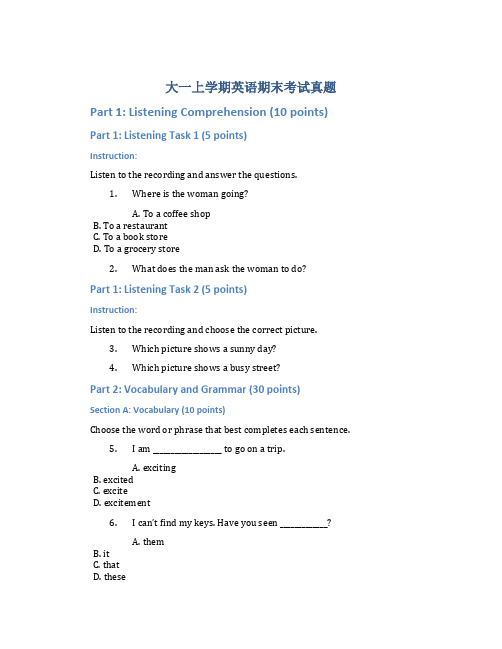
大一上学期英语期末考试真题Part 1: Listening Comprehension (10 points) Part 1: Listening Task 1 (5 points)Instruction:Listen to the recording and answer the questions.1.Where is the woman going?A. To a coffee shopB. To a restaurantC. To a book storeD. To a grocery store2.What does the man ask the woman to do?Part 1: Listening Task 2 (5 points)Instruction:Listen to the recording and choose the correct picture.3.Which picture shows a sunny day?4.Which picture shows a busy street?Part 2: Vocabulary and Grammar (30 points)Section A: Vocabulary (10 points)Choose the word or phrase that best completes each sentence.5.I am ___________________ to go on a trip.A. excitingB. excitedC. exciteD. excitement6.I can’t find my keys. Have you seen _____________?A. themB. itC. thatD. these7.The weather is _____________ today than yesterday.A. more coldB. colderC. coldlyD. more colder8.The cat is _____________ the table.A. atB. onC. inD. under9.She is a _________________ student.A. hardly-workingB. hard-workC. hard-workingD. hard-worker10.My sister is __________________ of all my relatives.A. oldestB. olderC. the oldestD. the older11.I have _______________ money to buy a new phone.A. too manyB. too muchC. many tooD. much too12.___________________ do you go to the gym?A. How oftenB. How farC. How muchD. How long13._________________ in the park last Sunday?A. What were you doingB. Where were you doingC. When were you doingD. How were you doing14.Don’t forget _________________ the door when yo u leave.A. lockingB. lockedC. to lockD. lockSection B: Grammar (20 points)Choose the word or phrase that best completes each sentence.15.If John _______________ the bus, he will be here soon.A. tookB. takesC. will takeD. take16.By the time you arrive, we _______________ dinner.A. will finishB. had finishedC. finishedD. have finished17.Jim _______________ to help me with this project tomorrow.A. comeB. will comeC. is comingD. came18.I’m going to _______________ accounting next semester.A. studyB. studyingC. studiedD. studies19.I _______________ to the beach if it’s sunny tomorrow.A. will goB. would goC. would have goneD. go20.Robert ___________________ his sister for ten years.A. didn’t seeB. hasn’t seenC. hasn’t been seeingD. hasn’t saw21.The more you practice, _______________ you will get.A. the betterB. betterC. moreD. best22.How many people _______________ the party last night?A. attendedB. attendC. attendsD. attending23.She asked me if _______________ dinner.A. I already haveB. have I alreadyC. had I alreadyD. already I had24.He works hard, _______________ he doesn’t always succeed.A. butB. soC. andD. or25._______________ to visit the Grand Canyon?A. Did you ever beenB. Do you ever goC. Have you ever beenD. Will you ever visit26._______________ the news last night?A. Did you watchB. Do you watchC. Are you watchingD. Have you been watching27.The girl _______________ her homework before watching TV.A. must finishB. had to finishC. has to finishD. must finished28.You can borrow my car ___________________ you promise to drivecarefully.A. providedB. unlessC. becauseD. while29.I’m not sure ______________ he likes chocolate or not.A. ifB. whetherC. whichD. that30.She will call you as soon as she _______________ back.A. getsB. gotC. will getD. has gottenPart 3: Reading Comprehension (30 points)Read the passages and choose the correct answer.Passage 1:John and Lisa are planning a trip. They want to visit a place that has both beautiful scenery and historical sites. John thinks they should go to Italy because it has famous cities like Rome and Venice, and they can visit the Colosseum and take a gondola ride. Lisa disagrees. She believes they should visit China because it has the Great Wall and the Forbidden City. They can also try traditional Chinese foods and experience the rich culture. After discussing both options, they decide to go to China.31.Where do John and Lisa want to visit?A. ItalyB. ChinaC. FranceD. Spain32.What can they visit if they go to Italy?A. The Great WallB. The Forbidden CityC. The ColosseumD. The Eiffel TowerPassage 2:Nowadays, more and more people are choosing to work from home. They have the freedom to create their own schedule and save time by avoiding the daily commute. Additionally, working from home allows people to be close to their families and spend more time with their loved ones. However, some people argue that working from home can lead to a lack of work-life balance as it becomes difficult to separate work and personal life. It is important to find a balance and create a dedicated workspace at home.33.What is one advantage of working from home?A. Creating a scheduleB. Avoiding the daily commuteC. Separating work and personal lifeD. Being away from family34.According to the passage, what should people do to find a balancewhen working from home?A. Stay away from their loved onesB. Avoid working for long hoursC. Create a designated workspaceD. Quit their jobsPart 4: Writing (30 points)Write an essay of about 200 words on the following topic:。
大一英语期末考试知识点
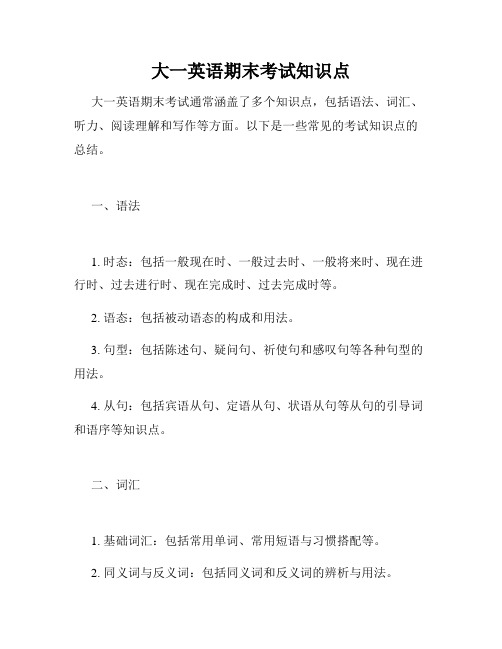
大一英语期末考试知识点大一英语期末考试通常涵盖了多个知识点,包括语法、词汇、听力、阅读理解和写作等方面。
以下是一些常见的考试知识点的总结。
一、语法1. 时态:包括一般现在时、一般过去时、一般将来时、现在进行时、过去进行时、现在完成时、过去完成时等。
2. 语态:包括被动语态的构成和用法。
3. 句型:包括陈述句、疑问句、祈使句和感叹句等各种句型的用法。
4. 从句:包括宾语从句、定语从句、状语从句等从句的引导词和语序等知识点。
二、词汇1. 基础词汇:包括常用单词、常用短语与习惯搭配等。
2. 同义词与反义词:包括同义词和反义词的辨析与用法。
3. 词性与词汇搭配:包括名词、动词、形容词和副词等词性的用法以及常见的词汇搭配。
三、听力1. 听力材料:包括对话、独白、新闻报道等各种听力材料。
2. 听力题型:包括听力选择题、填空题、判断题等各种题型。
3. 听力技巧:包括抓关键词、预测内容、注意时间等听力技巧。
四、阅读理解1. 阅读材料:包括短文、图表、广告等各种阅读材料。
2. 阅读题型:包括选择题、填空题、判断题和匹配题等各种题型。
3. 阅读技巧:包括略读、精读、提前预测、寻找关键词等阅读技巧。
五、写作1. 作文题目:根据具体考试要求写作不同主题的作文,可能涉及到描述、议论、说明和应用文等不同的文体。
2. 写作结构:包括引子、主体、结尾等作文的基本结构。
3. 写作技巧:包括使用丰富的词汇、合适的句式、清晰的逻辑和恰当的语法等写作技巧。
以上是大一英语期末考试常见的知识点总结。
希望通过对这些知识点的复习和准备,能够在考试中取得好成绩。
祝你成功!。
- 1、下载文档前请自行甄别文档内容的完整性,平台不提供额外的编辑、内容补充、找答案等附加服务。
- 2、"仅部分预览"的文档,不可在线预览部分如存在完整性等问题,可反馈申请退款(可完整预览的文档不适用该条件!)。
- 3、如文档侵犯您的权益,请联系客服反馈,我们会尽快为您处理(人工客服工作时间:9:00-18:30)。
大一上学期英语期末考试复习资料
必会单词与词组
Unit 1:
1.reward 奖赏;回报
2.positive 积极得;确实得;明确得
3.former 在前得;以前得;旧时得;前者
4.opportunity 机会;时机
5.access享用权;通道;入口
6.participate 参与;参加
7.virtual 虚拟得;实质上得;实际上得
8.mitment 投入,致力,献身;承诺,许诺,保证
9.minimum 最低得;最小得
10.embarrass 使尴尬,使难堪
11.post 发帖子;张贴
12.benefit 益处,好处
13.insight 深刻得见解
14.municate 交流,交际;传达,传播
15.favorite 最喜欢得
16.gap 差距
17.at times 有时,偶尔
18.be worth sth、/doing sth 值得…得
19.not only…but also…不仅…而且…
20.far from 一点也不
21.a couple of 两个;一些;几个
22.get/have/obtain access to 有权享用
23.participate in参加
24.keep up with 赶上
25.feel like sth/doing sth 想要;想做
26.give up停止,放弃
27.think out推敲,琢磨,仔细考虑
28.e across偶然遇到
29.reap the benefit(s)得到好处
30.trade for用…换…
31.give sb insight(s) into深刻理解
32.now that既然,由于
33.instead of 而不就是,代替
34.reach out to 接触,联系
Unit2:
1.concern担心,忧虑
2.forth 出来,向外
3.burst冲,闯
4.stuff东西
5.thorough全面得,彻底得
6.disgusting令人厌恶得,令人反感得
7.upset不适得
8.tune 曲调
9.offensive 讨厌得;令人不快得
10.appeal 吸引
11.rid 摆脱…得
12.negative负面得
13.influence影响
14.patience耐心
15.along with一起,一道
16.turn off关闭
17.burst into闯入;突然开始
18.over and over一再,反复
19.reach for伸手去摸;
20.turn up调大,开大
21.turn down调小,开小
22.as well as除…以外;与
23.turn on打开开关
24.as usual像往常一样
25.in peace and quiet平静地
26.wake up(使)醒来
27.make one’s blood boil使某人生气
28.get rid of摆脱;除去
29.knots in one’s stomach紧张,不安
30.in any case无论如何;不管怎样
31.talk sth over商议,讨论
Unit4:
1.impression印象
2.conscious意识到得,有意识得
3.range变动;范围
4.introduction介绍,引见;引进
5.encounter意外相遇
6.focus使集中
7.physical身体得;物质得
8.rate速度;率
9.impress给…留下深刻得印象
10.shake摇动
11.match与…相一致
12.depress使抑郁
13.contact接触;联系
14.relax放松
15.powerful有影响力得;强壮得
16.entertainment娱乐
17.roar咆哮
18.make up one’s mind 下定决心
19.range from…to…从…到…变化
20.be mitted to献身于
21.be absorbed in全神贯注于
22.fix one’s eyes on凝视
23.drive sb crazy逼得某人发疯
24.at one’s best处于最佳状态
25.lighten up放轻松
26.take sb or sth seriously认为某人或某物重要Unit6:
1.continuous连续得
2.wicked极坏得
3.tremble颤抖
4.dump倾倒;垃圾场
5.route路线
6.outdoor户外得
7.outdoors在户外
8.register意识到;注意到
9.indoors在室内
10.peculiar奇怪得,罕见得;独特得
11.graduate毕业
12.boast夸口,吹嘘
13.employment职业,工作
14.contrary相反得
15.harm伤害
16.theory理论
17.head to去;去往
18.make the rounds逐一巡查、访问
19.go with与…相配
20.look sb in the eye(s)坦然正视某人
21.at the sound of一听到
22.nothing but只就是
23.be/feel ashamed of为…感到羞耻
24.boast about/of吹嘘
25.stay away from避开
26.stay at停留在
27.contrary to与…相反
28.look down on/upon瞧不起
29.be in for将遭遇
30.hold water经得起考验
31.leave behind忘记带;留下
Unit7:
1.unusual不寻常得,不一般得
2.shave剃(胡须),刮(毛发)
3.instinct本能
4.sideways向一边,从侧面
5.slight瘦小得
6.polish擦光,擦亮
7.attach系,贴
8.identify识别
9.offend违法;冒犯
10.detail细节
11.mercy慈悲,怜悯,仁慈
12.fade逐渐消失
13.fry油煎,油炒
14.rob抢劫
15.stiff(酒)浓得,烈性得;僵硬得
16.current流,潮流;现时得,当前得
17.foundation基础
18.stick插入;粘贴
19.face to face (with)面对面得;面临着
20.pull into(车)停靠,驶向(一旁)
21.as if好像
22.attach…to…系在…上
23.have mercy on sb对某人仁慈
24.get to one’s feet站起来
25.look through浏览;查找
26.out of control失去控制
27.eat (away) at 侵蚀;消耗
Unit9:
1.arouse引起,激起
2.remarkable 显著得
3.ease容易;减轻
4.outstanding杰出得
5.acplish完成
6.investigate调查
7.mysterious神秘得
8.analysis分析
9.credit学分;信任
10.responsibility责任
11.amount数量
12.entertain考虑
13.alternative供选择得
14.grant给予;资助
15.cease停止
16.adapt适应
17.profit有益于;利润
18.alter改变
19.performance成绩;表现;表演
20.stand out突出,出色
21.no matter how/where/what不管怎样(哪里,什么等)
22.turn in上交
23.with ease容易地
24.sit back闲坐着
25.get behind拖延
26.get sth out of the way完成或处理某事
27.strike sb as sth给某人某种感觉或印象
28.have to do with与…有关
29.plow through艰难地完成
30.adapt to(使)适应
编:王。
